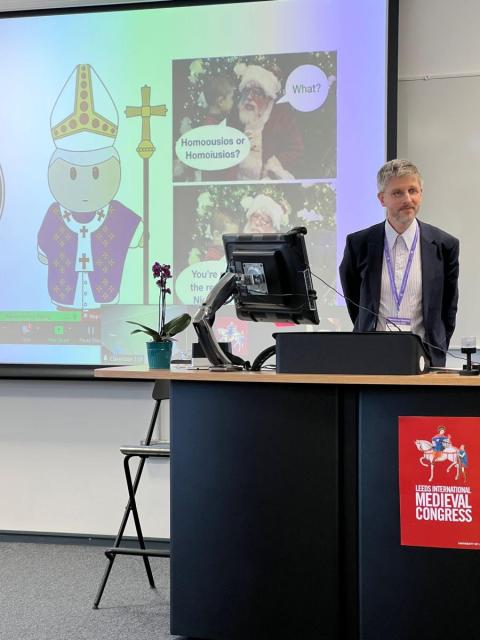
Conducted over a somewhat rainy week, this year’s Leeds International Medieval Congress was well attended by CEU faculty and students. On the morning of Monday, July 3, our professor Anna Somfrai gave her keynote, addressing the genesis and working of the physical and intellectual networks embedded in and based on medieval manuscripts. Keeping to this theme, Karsten Schuil reflected on both the quantitative and qualitative value of the Liber Fraternitatis of the Santo Spirito in Sassia (Rome, second-half of the fifteenth century). He argued, based on a case study of female Romipetae (Romeseekers), that membership of the fraternity was only on paper a case of transgressing social boundaries. In the case of the Liber Fraternitatis, the real exercise in transgressing social boundaries seems to be found in the search for God and salvation.
David Rockwell examined the privilege of Constantinopolitan bankers to have their lawsuits tried by specially designated officials vested with exclusive jurisdiction. This mark of favor, granted ca. 539–540 and renewed in 542, has not been much explored in the literature and not at all in comparative perspective. Yet pre-industrial economic law offers many comparanda that afford new perspectives on this privilege of Justinian’s bankers: the assembly (karum) of the Assyrian colony of Kanesh; the emporic court (δίκη ἔμπορική) of classical Athens; and the fair courts of medieval Western Europe, among others. David’s study demonstrated the utility of comparative legal methods to the study of late antique Byzantium; and to fill a gap in comparative law, which has unduly neglected the rich materials that Byzantine law provides.
In a panel on Loyalty and Polity, Michał Machalski’s paper investigated how two chronicles written at the courts of Polish dukes around the 12th century – Gesta principum Polonorum by Gallus Anonymous and Chronica Polonorum by Vincentius of Cracow – depicted relations of loyalty between rulers of the Piast dynasty and their subjects. Moving further south, Igor Razum introduced the topic of the advent of the first Franciscan and Dominican communities in Dalmatia. Mendicant houses in the province were founded as early as the 1220s and enjoyed success in cities and towns on the eastern Adriatic (Zadar, Split, Šibenik, Trogir, Dubrovnik). His paper dealt with the initial contest starting in the thirteenth century between the mendicant newcomers and the secular clergy, and how the mendicants quickly became bishops and favored religious groups in some of these Adriatic communities.
Anja Božič’s paper dealt with a yet unedited sermon in praise of St. Jerome. This sermon was delivered on Sept 30, 1410 in Padua for Jerome's feast day by a student of the University of Padua, Niccolo Bonavia. In her paper, she explored the textual flow of this work in manuscripts in which the oration is preserved in order to illustrate 1) its popularity, based on a) the number of early 15th century mss in which it is preserved and b) the works with it is combined in these mss; and 2) its new function as a literary work and example of rhetorical skill.
Professor Volker Menze’s paper argued that the Ariminian(/“Arian”) Church in Visigothic Spain was, in its structure and organization, probably rather different from the Nicene Church: no dioceses are known, its ecclesiastical hierarchy may have differed, its clerics barely received proper theological education etc. In comparison, he presented the Assyrian Church of the East, the so-called “Mountain Nestorians” in the 19th century. We are surprisingly well-informed about this isolated Church by travellers, scholars and missionaries who visited the Assyrian patriarch and his flock in the Kurdish mountains. Its tribal and ethnic character, the hostile environment and the lack of education of its clerics appears to make it a fitting comparison for the Visigothic-Ariminian Church.
Dunja Milenkovic, Juan Manuel Rubio Arevalo and Andrei Dumitrescu also gave papers, and Anastasia Theologou organized a CEU panel on Neoplatonists, whilst Gerhard Jaritz, Gábor Klaniczay and Daniel Ziemann spoke in a roundtable celebrating the publication of the Oxford Handbook of Medieval Central Europe, prompting further interdisciplinary collaborative debate about this region and its role in the global medieval world.